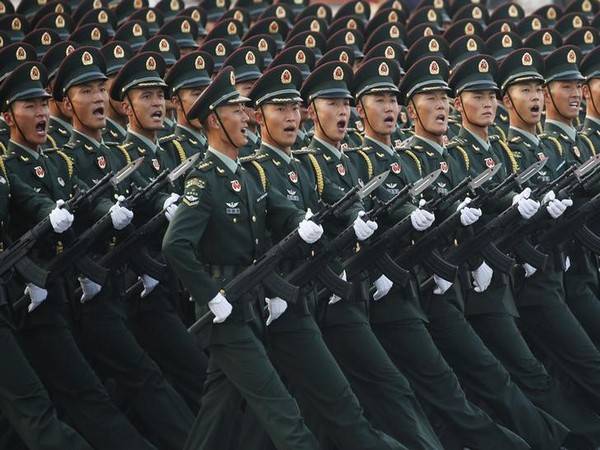China has stepped up the anti-corruption purge into People’s Liberation Army Rocket Forces (PLARF)….reports Asian Lite News
Controversy dogs the PLA Rocket Forces over charges of corruption as the current and the past leadership of the PLARF is under investigation. The Rocket Force has been in the limelight for the past many weeks over the reported suicide of its deputy commander Wu Guohua as well as other missing commanders.
In a report on July 28, the South China Morning Post (SCMP) says that the PLARF’s current commander, Li Yuchao, and a past and present deputy, Zhang Zhenzhong and Liu Guangbin are being investigated by the Central Military Commission (CMC)’s anti-graft body, the Commission for Discipline Inspection. SCMP says that the senior commanders have been taken away for investigations.
Along with investigation over corruption, suspicion surrounds the conduct of the current commander, Li’s son who is studying in the US. There are allegations that he has shared sensitive information with the US.
India Narrative had reported earlier about the problems in the Rocket Force as well as the mysterious disappearance of the newly appointed foreign minister Qin Gang, who has now been officially relieved of his duties. The report had also mentioned that besides cleansing the PLARF of corruption, the Chinese government has also been fearing internal strife and an uprising in the PLA.
The PLA has been a major target of Chinese President Xi Jinping’s anti-corruption drive which has impacted dozens of senior officials in the military.
Chinese journalist Jennifer Zeng has reasoned that the anti-corruption drive has had a detrimental effect on the military and has resulted in demoralisation of the forces. She has even linked the problems in the PLARF to Xi’s increasing insecurity and perceived threats from the PLA after the failed coup in Moscow.
Xi had alluded, while taking over his third term in October 2022, that the country would build strong strategic deterrence – which many had understood as boosting China’s nuclear stockpile. There have been reports in the Western media over the last couple of years about China constructing nuclear missile silos in Gansu province to accommodate an increasing pile of nuclear weapons.
‘China’s faltering global image’
China’s international image as an economic powerhouse is faltering across high- and middle-income nations, Al Jazeera reported citing Pew Research Center survey.
The survey released on Thursday found largely unfavourable opinions on China. 67 per cent of respondents shared negative views about Beijing while 28 per cent had positive perceptions, Al Jazeera reported. More than 30,000 adults participated in the Pew survey which was conducted in 24 nations, including the United States, Mexico, Germany, Australia, Brazil, Israel, Nigeria, Japan and India. The negative views about China were largely concentrated in high-income nations like Australia, Sweden, South Korea and Japan.
The negative views regarding China were notably high in the United States, according to Al Jazeera report. 50 per cent of respondents in the US named China as the greatest threat to Washington in an open-ended question. Furthermore, 17 per cent of respondents named Moscow as a threat to Washington.
Respondents in nations like Indonesia, Nigeria, and Mexico expressed far more positive views of China, likely due to various factors, from its role in supplying 5G internet to middle-income nations to investments through projects like Belt and Road infrastructure initiative. In India, 67 per cent of respondents shared negative views of China.
33 per cent of respondents named China as the world’s top economic power while 42 per cent chose the United States, Al Jazeera reported citing the survey.
Meanwhile, China’s attempts to rebrand itself as a global peacemaker this year have also faltered even after it brokered a re-establishment of ties between Saudi Arabia and Iran. Beijing also offered to play a similar role in Ukraine and Palestine.
Speaking to the Pew Research Center, 71 per cent of respondents said they think China “does not contribute to global peace and stability” while 23 per cent shared a positive opinion on Beijing’s diplomatic activities, Al Jazeera reported.
Another 57 per cent called China an interventionist in global affairs, according to Al Jazeera. The viewpoint of respondents is contrary to the image that China has tried to project that it does not get involved in domestic issues of other nations.
Meanwhile, several Chinese top leaders have pointed out that the Beijing economy is facing “new difficulties and challenges,” The Standard Media reported. The leaders highlighted the concerns in a meeting of the 24-person Politburo on Monday.
China’s highest-ranking officials gather annually at the end of July to review the economic situation before their traditional summer break in August. The leaders met in 2023 as the post-COVID recovery in the world’s second-largest economy was running out of steam, due in large part to sluggish consumer spending, The Standard Media reported.
The Politburo agreed on Monday that Beijing must “implement precise and effective macroeconomic regulation, strengthen countercyclical regulation and policy reserves,” according to state broadcaster CCTV. The meeting, headed by Chinese President Xi Jinping, also called for efforts to expand domestic consumption and “adjust and optimize real estate policies in a timely manner.” (with inputs from agencies)

